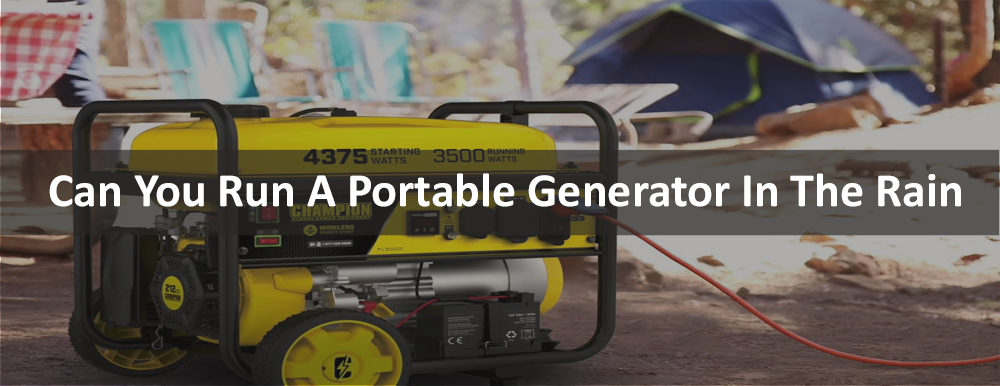Post Disclaimer
101 Generator is supported by its audience. When you purchase through links on our site, we may earn an affiliate commission. Learn more

Can You Run A Portable Generator In The Rain?
Power outages are running rampant in areas where weather fluctuations are extreme or are weather alerts more typical than in other areas. Similarly, in areas with power shortages or due to some technical fault in the grid supply line during summers and freezing winters, power breakdowns become pretty much common.
The thing that is required most in power breakdowns and outages is none other than a power backup source like a generator, UPS, or Solar panels. Generators are undoubtedly the most used secondary power source to date although electric and solar powers are also quite frequently used.
Generators are great for commercial and industrial-grade utility power requirements and this makes them also fit for heavy-duty appliances at home.
You can also choose a mini generator for running small appliances with minimal watts at home or a commercial-grade generator with 24K or 36K wattages. Well, whatever wattage of the generator you are using, you need to ensure the safety recommendations for proper and secure use of the generator.
One of the common tips or recommendations for using generators is to keep them in outdoor environments like on your patio, lawn, garage, or even your balcony if no outdoor space is available like in mini apartments and flats.
But what should be done if it is raining heavily outside and the power outages are running rampant, particularly during the rainy season? You should know the safety tips for using the generator in rain and the ways of properly placing your generator in outdoor settings without ruining it.
So, let’s get started with if you can use the generator in rain or not. After that, we will suggest some tips for the safe and secure usage of generators in the rain without running your device.
Can You Run A Portable Generator In The Rain?
Every generator be it electric, gasoline or even propane and gas requires a low humidity level for optimum operation. It is recommended to keep the generator away from wet places and similarly during wet weather generators should be avoided being used if possible. In simple words, you shouldn’t be using the generator in wet weather or rainy days to avoid damage to your generator.
Wet or rainy weather is highly likely to cause electrocution that will lead to serious damage to the generator engine causing its breakdown and thus complete damage to your device.
Therefore, it should be prevented at the earliest possible stage to avoid any serious or detrimental damage to the engine.
Although generators shouldn’t be used on rainy days you can enjoy the power supply from your generator placed on your outdoor patio or lawn if you have built a strong shelter for it.
Most homes have set a specific place for the generator and have built a tent or shelter for protecting it from environmental hazards like scorching heat or rainwater. So, you can place your generator under the shelter which can be either a small dog hole or rack under which the generator is kept.
How To Protect Generator From Rain?
Now, that you are sure about using the generator in wet or rainy weather, you must be having some highly successful tips and tricks to prevent your generator from any serious or alarming damage.
If otherwise, you shouldn’t try using it under the rain and wait patiently for your grid power to return or the rain to stop.
But worry not we have solutions to your problems like always and the same goes for your generator. Given below is the most trusted aid for using your generator in the rain.
As we have stated above that you can use the generator in rainy or wet weather if it is properly covered by a tent or shelter. But what should be done if you don’t have already built the shelter and now want to power your generator under rainy weather?
Should you try taking it indoors? Well, not! Never ever try using your generator indoors as it can put the house members in damage. Even the most ventilated areas of the home are under severe threat of suffocation and carbon monoxide intoxication under generator usage.
Therefore it is ideal to not put yourself at risk and prioritize your safety above having the power supply at your home.
So, what is the other way around? Instead of dragging your generator to inside, you should look for something to cover it from the rainwater. But be sure of its protection as partially covering it will not reduce the damage nor protect the engine from electrocution.
There are plenty of good bargain basement generator covers that prevent water and humidity but these are not strong enough protectors to stand guard against heavy rain.
There are many great waterproof covers like the one coming from IGAN. These IGAN covers are not just waterproof but are also wind and storm-resistant along with their snowproof built. Thus, these IGAN waterproof generator covers will allow you to keep using your generator in the outdoor and external home environment without minding the weather outside.
Final Words:
You can use some durable and widely trusted generator covers like the one coming from IGAN. These covers provide wind, water, snow, and storm protection and will be a great aid for using the generator in outdoor conditions without being concerned about the weather and its damage to your generator.
Related Articles:
